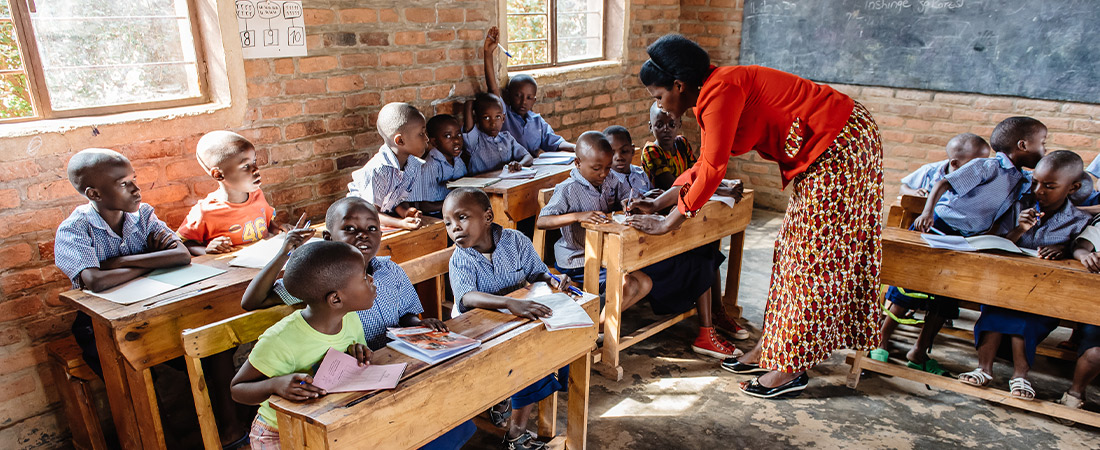Thank You, Teachers!
Great teachers inspire students to think, learn, and grow. Here are three stories.

To teach is to change lives. But how often do teachers hear about the impact they have had on their students?
For World Teachers’ Day, we talked to EDC staff about unforgettable teachers—and the life lessons that they taught.
Kristen Bjork: Memories of a Student-Centered Classroom
Everything that I do as an educator starts with piquing students’ interest. I believe that students only learn when they are curious about the material. For that, I credit two teachers in the Lincoln Public Schools: Susan Reece and Esther Braun.
Mrs. Braun and Mrs. Reece were colleagues in an integrated fourth- and fifth-grade classroom. They taught in a very progressive, experiential way, letting lessons unfold naturally and, often, chaotically. That classroom was magic. I remember students being deeply engaged in their investigations, and I remember everything as a hands-on experience. I’m not sure that we ever looked at a textbook. (Books yes, textbooks no.)
As I became an educator myself, I realized that Mrs. Braun and Mrs. Reece truly believed in the power of a student-centered classroom. I learned from them that even the best laid plans can go awry and that you need to be able to respond in a nimble fashion. The way they taught was crucial to my development as a curriculum developer. Engagement has to be the most important aspect of learning.
Andresse St. Rose: The Right Feedback at the Right Time
I’ve been privileged to have lots of wonderful teachers, but Mrs. Ferdinand, my high school chemistry teacher comes to mind this World Teachers’ Day. I attended an all-girls Catholic high school in Trinidad, and every year, we would have Parents’ Night, and every year a common refrain from my teachers to my mother would be, “Andresse is a good student, but she talks too much.” An accurate statement but not a terribly original one.
Then, in 10th grade, my chemistry teacher Mrs. Ferdinand provided some new feedback. She said, “Andresse is a good student, and she could be a better student if she was more consistent.” I said to myself, “Wait! This is different . . . what does this mean?” But then I knew what she meant. She meant that I studied, I did homework, I did whatever I had to do—but only when there was a test. She knew that I could have even better grades and be a better student if I studied and applied myself more consistently. She knew that I had goals and could do even better.
Mrs. Ferdinand’s feedback came at a critical time. I was in grade 10 and thinking ahead to college. I was the first person in my family to go to college. She helped me think about changes I could make to improve my grades versus just getting me to talk less. It was a key piece of advice for me as a young person. And she was no stranger: Mrs. Ferdinand’s daughter was my classmate, and her husband was our family doctor. They are part of my family’s fabric forever. She was the right person to give me that feedback at the right time in my life.
It was an ah-ha moment for me, and I took her feedback to heart, acted on it, and saw the difference it made in my grades and performance in high school, college, and beyond. Even today, at work, in my leadership practice, in my personal life, and in how I communicate, I seek to be consistent and help others be consistent. If I say I’ll do something, I do it. If I say something is important, I show that it is important by acting on it. Mrs. Ferdinand taught me both the importance of consistency and of providing and being open to feedback.
Zhandra Levesque: A Home Away from Home
I am from Caracas, Venezuela, and had the immense privilege of attending Tabor Academy, a boarding school in Massachusetts. While there, I learned first-hand about the power of leadership, the importance of integrity, and that true citizenship is defined by putting service above self.
Two teachers, Khalil Johnson and Anika Walker-Johnson, helped me find the power in my own voice and experiences. They guided me and truly embraced me as a member of their family when my own was so far away. With their support, I developed a new sense of self-reliance and self-confidence. I learned how to feel comfortable in uncomfortable situations and to chart my own path. I learned that nobody but me had the right to let anyone define my heritage or my self-worth. This was especially important as my time at Tabor was also the first time in my life where I looked different from my peers.
As both my teachers and advisors in the context of a residential school, their home was also a safe space, a place of family. I played with their children; I spent birthdays and holidays with them. The Johnsons deeply and sincerely believed in me and my dreams and that is simply priceless. Truly, when I reflect on my time at Tabor, their support and love is a bright spot.





